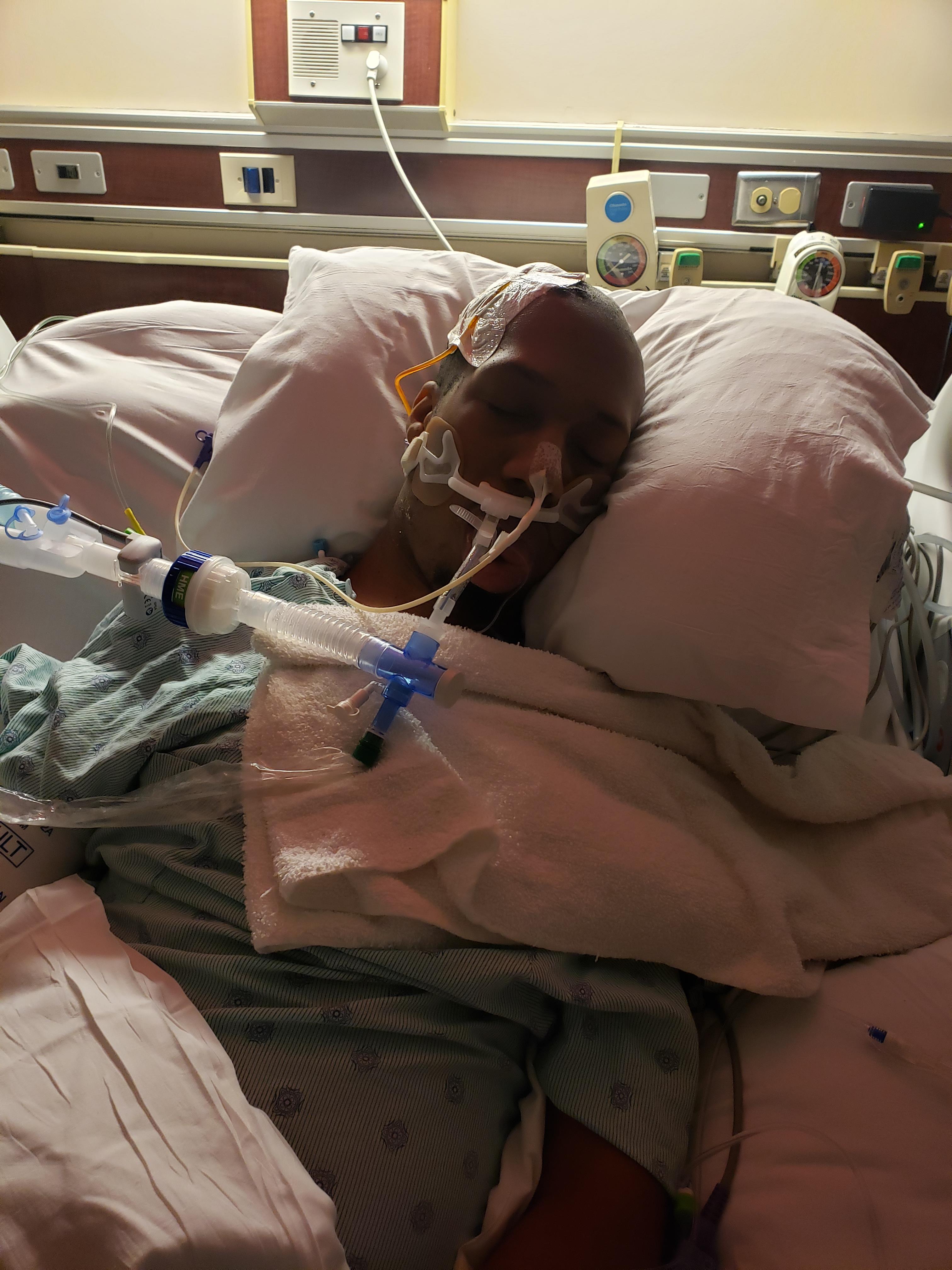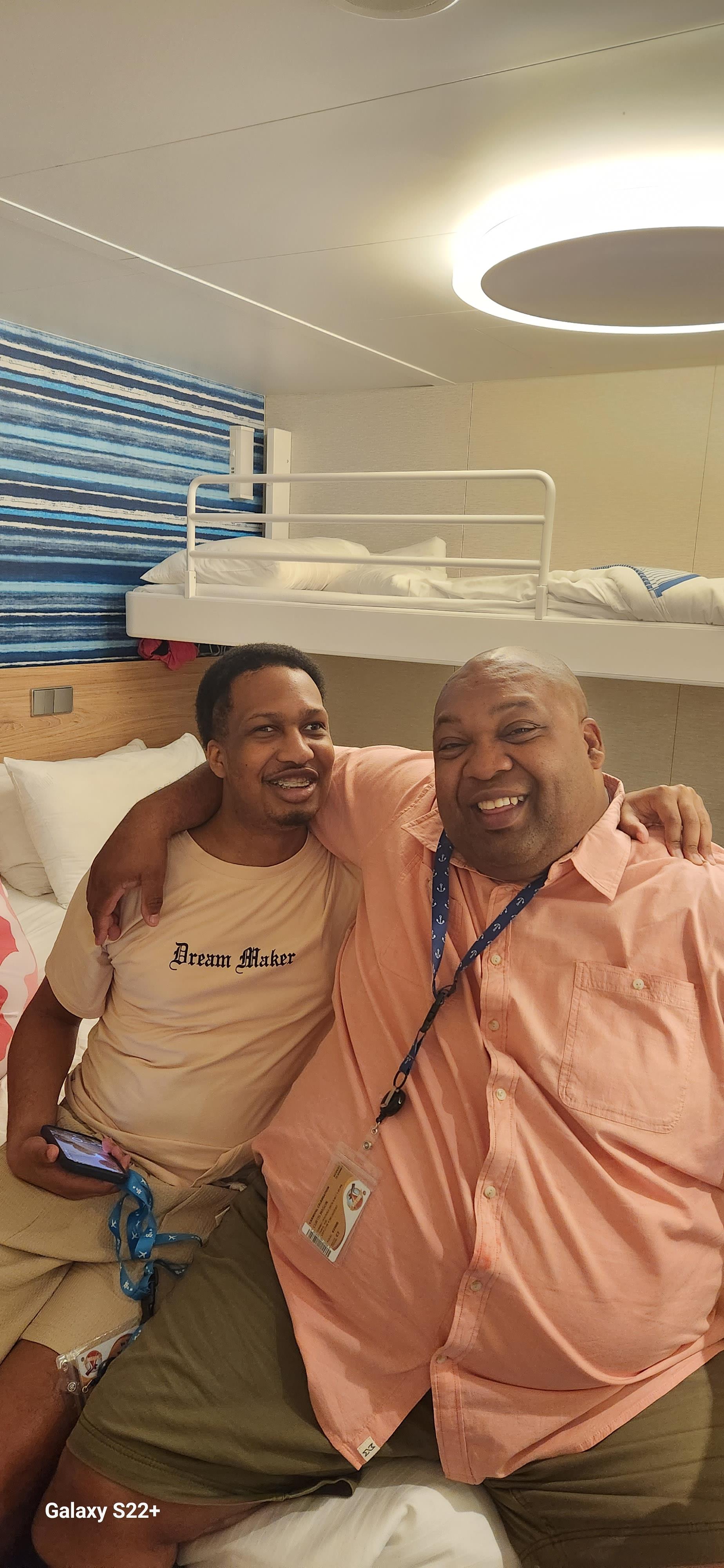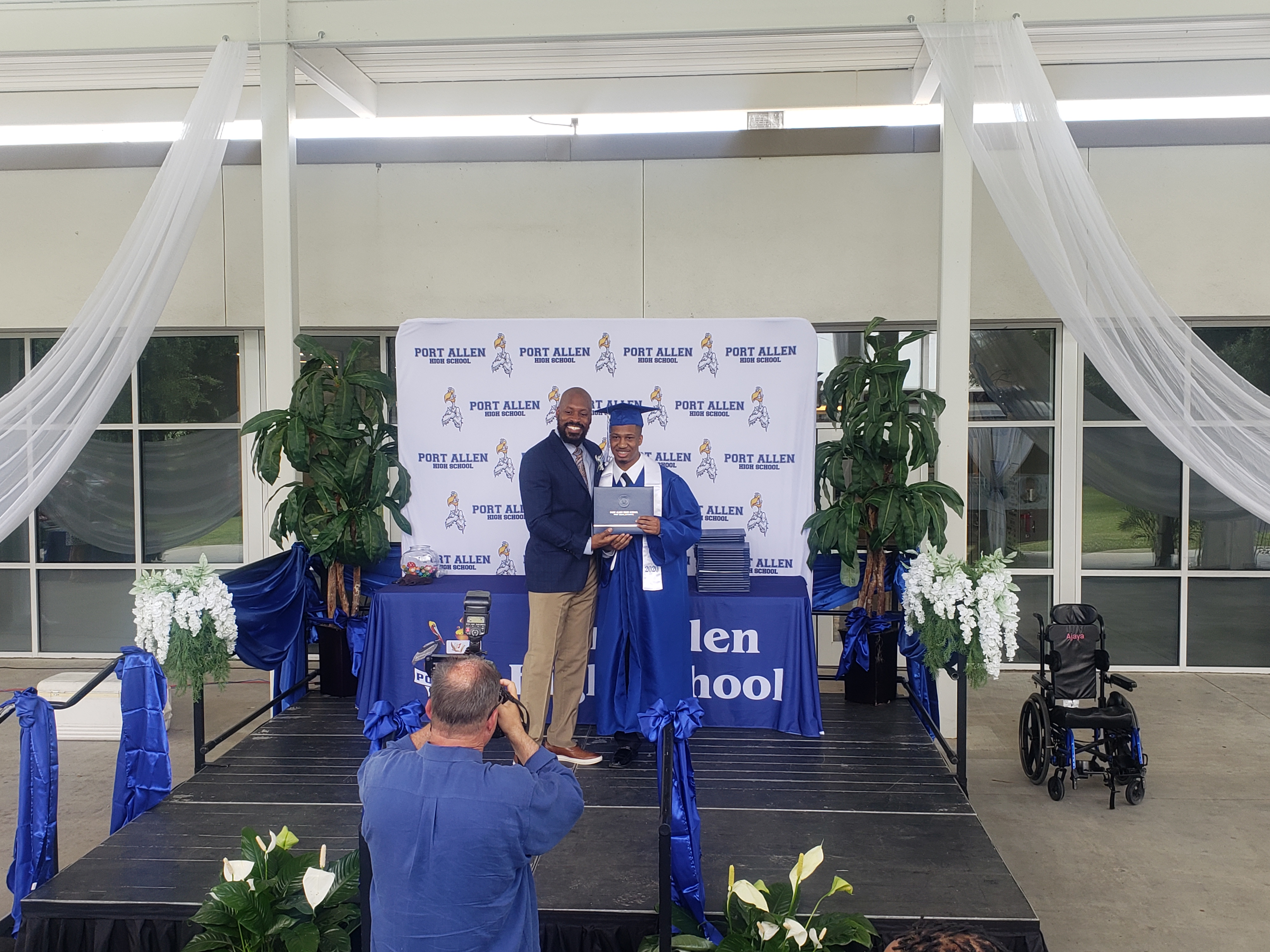Curtis' battle with a cancerous brain tumor
- Category: Patient Stories
- Posted on:

The Mason family encountered a curveball when their son, Curtis, was suddenly diagnosed with a cancerous brain tumor. However, their experience at Children’s Hospital New Orleans transformed their son Curtis’ shocking diagnosis with cancer into a remarkable story of courage, resilience and hope.
Clarice Mason, mom, reflected on the days before their lives were forever changed by Curtis’ diagnosis. “My son’s childhood was happy and full of family fun,” she recalled. In their close-knit family, Curtis enjoyed days filled with school, sports, and the simple joys of being young.
Curtis was always energetic and showed a real talent for sports, especially basketball. He stood out in AAU basketball as a teenager, not only for his skill but also for his positive attitude, earning respect from his coaches and teammates. “Seeing him play was always a highlight for us; he really had a way of making the game exciting,” Clarice said with pride.
Curtis was also a good student who liked wrestling, and spending time with his siblings and cousins. He took on a job at a local restaurant in his last year of high school, where he quickly made friends and was known as a hard worker. His parents remember how rewarding it was to see him becoming a responsible and independent child. 
At home, Curtis was always amongst good company with his three siblings and cousins. The house was always vibrant with activity and filled with laughter. However, when COVID-19 started spreading worldwide, it soon affected the Mason family as well. Curtis, just 19-years-old and looking forward to a fun summer, faced an unexpected and significant challenge.
The virus first affected his grandmother, then his parents, and finally Curtis. “We thought Curtis would get over it within a week or so like we did, but his condition got worse,” Clarice remembers. As Curtis continued to struggle, his parents began to realize the gravity of the situation.
Struggling to overcome COVID-19, Curtis was in and out of the hospital near their hometown of Port Allen, Louisiana. During one of his hospital stays, he had a routine scan which unexpectedly revealed a tumor at the base of Curtis’ brain. Things escalated from there and doctors had to act fast to help Curtis, performing a bedside procedure to drain fluid from his brain. Unfortunately, the procedure wasn’t as successful as doctors hoped, and Curtis went into a coma for three weeks.
The initial biopsy results revealed that the tumor had rapidly doubled in size. Doctors soon identified it as a non-germinoma germ cell tumor, specifically a pineal tumor, prompting the decision to transfer Curtis to the Center for Cancer and Blood Disorders at Children’s Hospital New Orleans for advanced, specialized neuro-oncology care.
“Getting to Children’s Hospital New Orleans started a new chapter for us,” Clarice said. “We were really scared, but the care, kindness and expertise started to make us feel a bit better.”
At Children’s Hospital New Orleans, the Masons embarked on a critical phase of Curtis’ medical journey, under the guidance of Maria C. Velez, MD, a pediatric hematologist-oncologist who specializes in neuro-oncology. Along with a multidisciplinary team, she focused on developing a comprehensive strategy to address Curtis’ complex condition.
Dr. Velez, highlighting the urgency and intricacies of the case, stated, “Curtis’ situation necessitated immediate, multifaceted care due to the aggressive nature of his non-germinoma germ cell tumor, a type of cancer that requires a precise, coordinated approach involving neurosurgery, neuro-oncology and neuroimaging.”
Curtis faced multiple brain surgeries, each carrying significant risks. His resilience during these periods was remarkable. His mother recalls the mix of anxiety and hope she felt, saying, “Each surgery was daunting, but witnessing Curtis’ courage and the medical team’s expertise brought us a sense of hope.”
In addition to surgical interventions, Curtis underwent aggressive chemotherapy and radiation therapy. Despite these intensive treatments, the tumor was growing, complicating his path to recovery. Dr. Velez elaborated on the evolving treatment plan, “Curtis’ journey was complex. The tumor demonstrated growth as a consequence of cell maturation, we adapted our approach, integrating the latest oncological advances and targeted radiation therapy techniques to effectively combat the tumor.”
Support from his family was essential for Curtis during his treatment. His siblings, cousins and other relatives were a constant source of emotional support, providing strength and comfort throughout his journey. “The love and energy from everyone really helped us during the hard times,” Clarice recalled. 
At Children's Hospital New Orleans, the care for Curtis extended beyond his physical treatment. The hospital staff also played a significant role in addressing the emotional needs of Curtis and his family. They had access to counselors and received ongoing support from the hospital's compassionate team, ensuring that their emotional well-being was not overlooked.
Eventually, scans revealed that Curtis’ treatment was working, and the tumor was beginning to shrink. This news brought a wave of relief and hope to the family, marking a positive turn in the recovery journey. Curtis’ recovery was significantly aided by the specialized care he received at the hospital. This included a variety of therapies tailored to his needs, such as physical, occupational and speech therapy, which played a critical role in helping him regain strength and mobility, a process that his family watched with gratitude and relief.
Jerome Volk, MD, a neurosurgeon at Children's Hospital New Orleans, was also integral to Curtis’ treatment and recovery. Dr. Volk emphasized the importance of a comprehensive approach, “In treating Curtis, we focused not just on the immediate neurosurgical challenges but also on his long-term neurological health. Our multidisciplinary approach included advanced neuroimaging and innovative surgical techniques, aiming to minimize potential cognitive and physical impacts while enhancing his recovery and future quality of life.”
After an intense and demanding period in the hospital setting, Curtis was able to take his healing journey back home. At home, the Mason family has adapted to a new way of life, one that involves caring for Curtis and supporting his ongoing recovery. “Life is different now, but we’re finding our way through it together,” Clarice explained. His condition has improved significantly, but there are still challenges. He visits Children’s Hospital New Orleans every six months for check-ups, a routine that has become part of their lives.
Curtis’ memory and cognitive abilities have been affected, requiring patience and understanding from the entire family. “We’ve all learned to communicate more clearly with Curtis and help him with his short-term memory issues,” added Clarice. The family works together to maintain a structured environment, which helps Curtis navigate his daily life more easily.
Despite these challenges, Curtis remains positive. "I feel good. I feel comfortable around them!” Curtis shared proudly. His family’s nickname for him – “Doo” – has even become a term of affection used by the medical staff, a sign of the close relationship and bond formed during his treatment.
The Mason family’s experience has given them unique insights and lessons, which they hope can help other families in similar situations. “For other parents and children going through similar experiences, always have faith, stay strong and stay together. It’s okay to ask for help, and it’s important to take things one day at a time,” Curtis’ parents advised. They emphasize the importance of leaning on support systems, both within the family and from external resources like the hospital team. 
As for Curtis, he maintains a positive outlook toward the future. He shows signs of recognizing his improvements and seems motivated by his progress. Although his journey has been challenging, it appears to have instilled in him a sense of purpose. The family is now living life and thriving together at home, just like it was before his diagnosis.
The Mason family’s story is a testament to the power of resilience, the importance of family support, and the crucial role of expert medical care. Their journey with Children’s Hospital New Orleans has been transformative, and they are grateful for the care and support they received.
For more information about the care and support offered to the Masons by Children’s Hospital New Orleans, visit the Hematology & Oncology, Neuro-Oncology and Neurosciences web pages.



